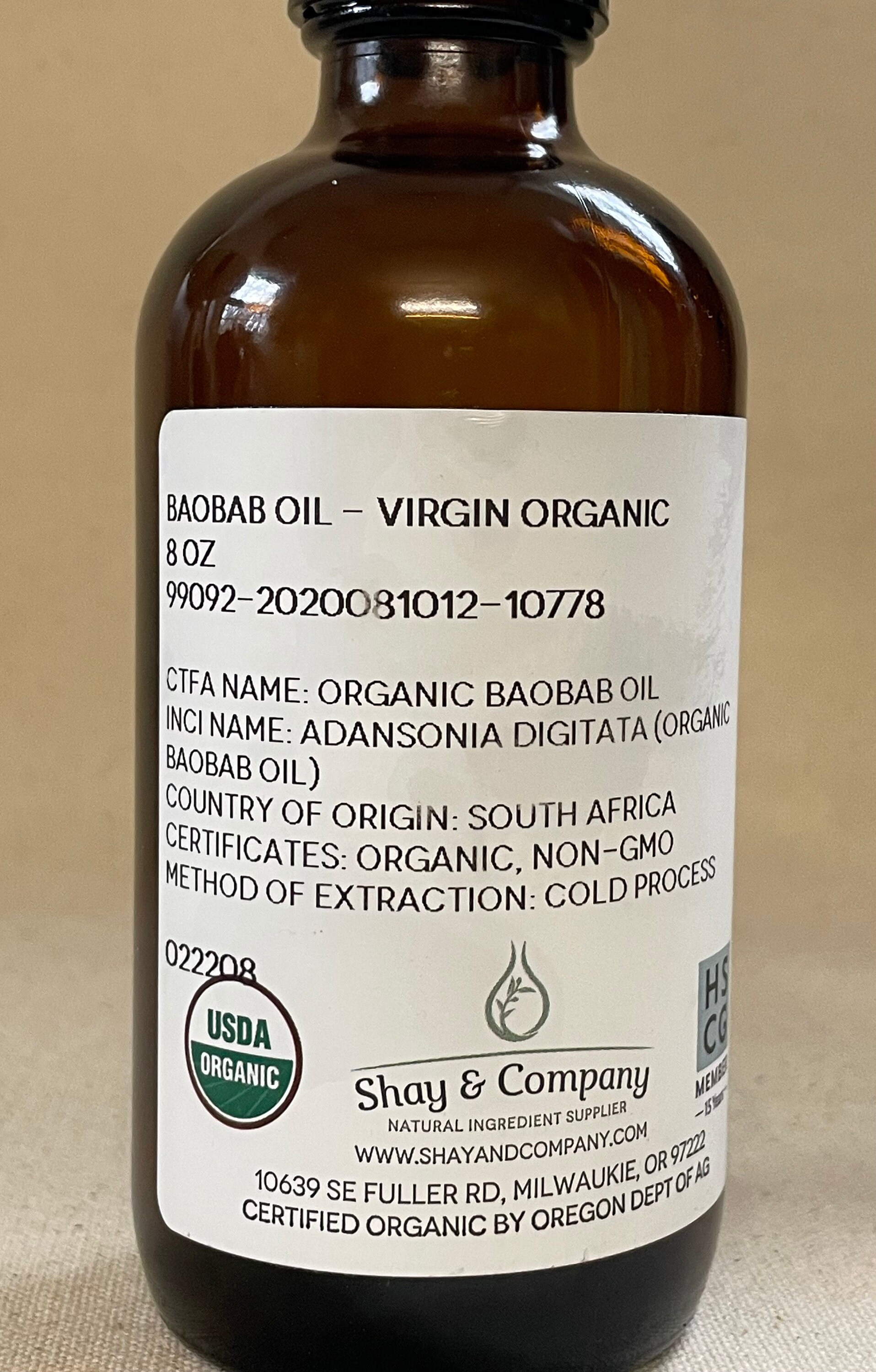Baobab Oil:

I first learned about the Baobab tree while reading Le Petit Prince in my high school French class. I just loved the name…baobab (bay-oh-bob), fun to say. They are these majestic trees from the continent of Africa, that store moisture to survive the intense heat of their growing region. Massive trunks topped with a plane of greenery that only the tallest of animals, life giraffes, even have the potential to reach.
The mention of the baobab always brought back the memory of French class, until recently when I stumbled upon it for my products. And oh my goodness, what a find it was. The baobab is considered bewitched or magical by some indigenous people throughout Africa. This tree offers multi-purpose uses and every part of the plant is reported to be useful. The seeds and oil are used as medicines in the treatment of muscle wounds, dandruff and other skin ailments (Kamatou, Vermaak, & Viljoen, 2011; Kabore et al., 2011). In Africa this tree is nick named ‘The small pharmacy tree’ or the ‘Chemist tree’. Every part of the baobab tree has been studied and tested for its many benefits, and has been approved for the FDA, which is why you will see if now in more foods and products these days.
Baobab for Skin
Organic baobab oil is the “superfood” oil for all your go-to skincare formulas. It is a natural source for vitamins A, C, D, E and K, and Omega fatty acids 3 (palmitic acid, oleic acid, linolenic acid,linoleic acid), 6 and 9 which help the cells perform optimally and keep the skin healthy. These omega-3s have been clinically proven to moisturize, help prevent water loss from the skin keeping it hydrated, soften skin, improve skin texture, improve skin elasticity, help repair the skin barrier, and help to heal skin faster. They are also thought to help with reducing inflammation, regulating oil production, reducing signs of aging and reducing blemishes. Because of its cellular structure, it can penetrate into the dermis layer for deep hydration and healing, without leaving the skin feeling greasy making it a lovely oil for the skin. This is a great oil for a greaseless moisturizer.
Acne treatment
A clinical trial found that baobab oil may help improve acne in some people. This is because it’s high in linoleic acid, a kind of omega-3 fatty acid that has anti-inflammatory properties.For this reason, baobab oil may help reduce skin redness, irritation, and swelling to treat acne. However, baobab has a comedogenic rating of 2, making it moderately low for clogging pore and causing acne. So it is always recommended if you have oily, acne-prone or sensitive skin to do a small patch test first, as it can also have irritating effects on those with sensitive skin.
Soothing Eczema
Baobab oil may also help to treat eczema. The omega-3 fatty acids in this oil may help heal the skin’s barrier and lock in moisture when it’s used as a topical skin treatment. The constituents of this amazing oil also have anti-inflammatory effects that can help heal or soothe an eczema rash. If you have very oily, acne-prone, or sensitive skin, use baobab oil sparingly. It may block some people’s pores, which can cause or worsen acne. It may also lead to skin irritation or rash in some people.
Skin Cells Rejuvenation The skin easily gets damaged by a lot of factors, especially environmental factors, like the sun and wind, or harsh skin "care" products. Since the baobab oil contains skin loving vitamins and nourishing nutrients, it can heal the skin from within and rejuvenate the cells. Its anti-inflammatory properties may also decrease the redness of the skin and reduce inflammation.
Restoration and Production of Collagen
Baobab oil contains vitamin C which is needed by the skin to help reduce skin cell aging. It also stimulates the skin’s production of collagen and restores the collagen on aged skin.
Reduction of Stretch Marks or Scars
The vitamin content of baobab oil helps to reduce stretch marks and visible scars. It maintains the skin elasticity and stimulates the production of collagen and elastin under the skin. This heals the stretch marks in the process.
Temperature Regulation
Baobab oil has an insulation-like effect on the skin to protect it from excess high and low temperatures, which is a weird but interesting and fascinating property.
Baobab for Hair
Baobab oil has been used to treat the scalp to help prevent dry scalp, flaking, and dandruff. The high omega-3 fatty acid in baobab oil is also good for your hair. When used as a hair mask or a leave-in conditioner, baobab oil may help moisturize dry hair and strengthen weak, brittle hair. However, Baobab oil isn't high in protein, so for the best results for repairing damaging hair is to pair it with protein-rich oil or extracts to get the best results. When baobab oil is added to hair care products, it leaves hair naturally shiny and silky.
My takeaway
Baobab oil is a lovely oil that has several health properties. The vitamin and high omega-3 fatty acid content of this seed oil might make it beneficial for your skin and hair, which is why you might be seeing it used more in commercial products, but also why I am so excited about it. Just remember, like any new product, it is best to patch test first before diving right in, and if you are nursing, refrain from use. Keep a look out for this lovely oil in my products! Enjoy!
Sources:https://www.conserve-energy-future.com/benefits-baobab-oil.php https://shayandcompany.com/product/baobab-oil-organic/ https://www.ncbi.nlm.nih.gov/pmc/articles/PMC5555379/#R15
Tree Photo Credit: Tuul & Bruno Morandi / Getty Images
